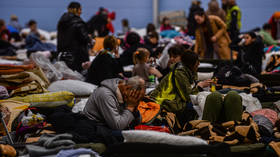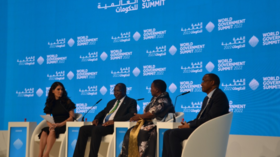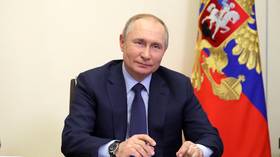Putin warns West of new migrant crisis

Russian President Vladimir Putin has warned Europe of a new influx of migrants that, in his opinion, will “inevitably” follow the food crisis.
Discussing on Thursday the unprecedented sanctions imposed on Moscow by the West in response to the Russian attack on Ukraine, Putin criticized the behavior of some Western politicians, who are allegedly prepared to sacrifice their citizens’ interests in order to “enjoy the good graces of their overseas master and overlord [implying the US],” branding such an approach as “the opposite of populism.”
“People are urged to eat less, put on more clothes, and use less heating, give up on travel – presumably for the benefit of the people who are demanding this kind of voluntary deprivation as a sign of some abstract North Atlantic solidarity,” Putin said at a meeting on air transportation and aircraft manufacturing on Thursday.
He underlined that Moscow has been seeing “such questionable approaches and actions” in economic, energy, and food policies for more than a year.
Incidentally, the food crisis will inevitably be followed by another one, another wave of migration, primarily to the European countries.
A few days ago, the risks of an “unprecedented” global food crisis were discussed at the G7 summit in Brussels. Since Russia and Ukraine are key crop suppliers in the world, the G7 leaders have blamed Moscow’s offensive in Ukraine for a looming crisis and are now discussing a package of measures to prevent food shortages.
Nevertheless, in Putin’s opinion, the West continues to make decisions that “are pushing the global economy towards crisis,” leading to the disruption of production and logistics chains, an increase in global inflation, and the aggravation of inequality, to a decline in the living standards of millions of people, and to mass famine in the poorest countries.
Putin accused the US of trying to solve its own problems at the expense of other countries and to shift the blame for its own economic mistakes onto Russia. Moreover, in the president’s opinion, the US is going to try to cash in on the current global instability, for example, by attempting “to push Europe towards expensive American liquid natural gas.”
Putin added that all the sanctions which are being imposed on Moscow now “have been prepared in advance” and “would have been imposed in any case.” They are poised, according to the president, “to curb Russia’s development,” to undermine its sovereignty and to weaken its “industrial, financial and technological potential.”
Taking into consideration the fact that the West has been imposing the restrictions against Russia for many years, there is no point thinking that this approach would change any time soon, Putin emphasized.
The West strongly condemned Russia’s military attack on Ukraine, calling it “unlawful” and “unjustified,” and slapped Moscow with hard-hitting sanctions, covering many sectors of the Russian economy. The restrictions include Washington’s ban on energy imports, an international ban for the use of the SWIFT interbank messaging system, and personal sanctions against Putin. Hundreds of companies have suspended or completely halted their operations in Russia.
In response, Moscow has included most of the Western countries in its list of “unfriendly states.” All of these countries are now subject to various retaliation measures, restrictions, and specific requirements from Russia. For example, Moscow now wants all “unfriendly” states to pay for gas supplies in rubles. Another retaliatory initiative saw the Finance Ministry requesting that Russian companies that want to work with firms from countries on the list receive government permission first.
Moscow attacked its neighbor in late February, following Ukraine’s failure to implement the terms of the Minsk agreements signed in 2014, and Russia’s eventual recognition of the Donbass republics in Donetsk and Lugansk. The German and French brokered protocols had been designed to regularize the status of those regions within the Ukrainian state.
Russia has now demanded that Ukraine officially declare itself a neutral country that will never join the US-led NATO military bloc. Kiev insists the Russian offensive was completely unprovoked and has denied claims it was planning to retake the two republics by force.














